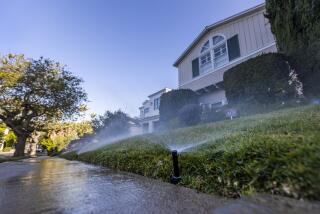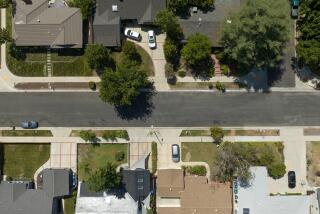Opinion: Drought shaming: Not a good way to promote water conservation
- Share via
There’s something about a crisis that brings people together. Unless it’s California and it’s a drought, in which case neighbors start to turn on each other.
There’s a boom in drought shaming, with people posting pictures of sprinkler puddles and complaining about their neighbor’s 20-minute shower on social media. Water agencies that set up hot lines or email addresses for “water conservation education” are receiving hundreds, even thousands, of reports of wasters. The State Water Resources Control Board upped the ante this week by prohibiting blatant water waste, such as hosing down sidewalks, and allowing local authorities to issue fines of up to $500 for profligate use.
There’s no question that Californians need to do a better job conserving water – some communities have actually used more water since Gov. Jerry Brown declared a drought state of emergency in January. But I see some issues with the drought-shaming, turn-your-neighbor-in approach to water conservation.
First is the squeaky wheel problem. Only certain water wasters – the ones with the neighbors willing to report them – will get warnings or potentially be fined. You could water your lawn for an hour a day and never hear from the water cops if your neighbors turn a blind eye. One water district said a neighbor tattled on a father who put a Slip’N Slide in his yard for his child’s birthday party, the San Francisco Chronicle reported.
Then there is the Hatfields and the McCoys problem. By encouraging people to rat out their neighbors, water agencies might be creating or fueling neighborhood feuds. In Santa Cruz, some complainers appeared to be using the anonymous reporting system to indulge old grudges, the New York Times reported. “You get people who hate their neighbors and chronically report them in hopes they’ll be thrown in prison for wasting water,” Santa Cruz Water Conservation Manager Eileen Cross told the newspaper.
Rather than ticketing the homeowner with the persnickety neighbor, water agencies would be better off adopting more sophisticated systems to track water use and tiered pricing models that levy high fees on customers who exceed reasonable water consumption.
Some water agencies, such as the Los Angeles Department of Water and Power, already have tiered pricing. Customers are allotted a certain amount of water at the cheapest rate. The allotment is based on the property size, temperature zone and number of people living in the household. Every gallon of water used over that allotment costs more. If water agencies wanted to send a real message to water wasters, they could levy a high penalty for customers who use double their allotment.
The challenge with tiered pricing is that customers may not realize they are water hogs – or that they have a leak - until the bill comes and they’re hit with big penalties. It would be great if water agencies had automated systems to track usage and alert customers when they’re consuming way more water than they did the previous year, or if they’re about the exceed their allotted use. (Kind of like the way mobile phone companies alert customers when they’re approaching their data limit.) If I realize that I’m going to bust my water budget one week into the month, I’m going to make significant adjustments immediately. And it won’t take my neighbors ratting me out to do it.
For more opinions, follow me @kerrycavan
More to Read
A cure for the common opinion
Get thought-provoking perspectives with our weekly newsletter.
You may occasionally receive promotional content from the Los Angeles Times.







